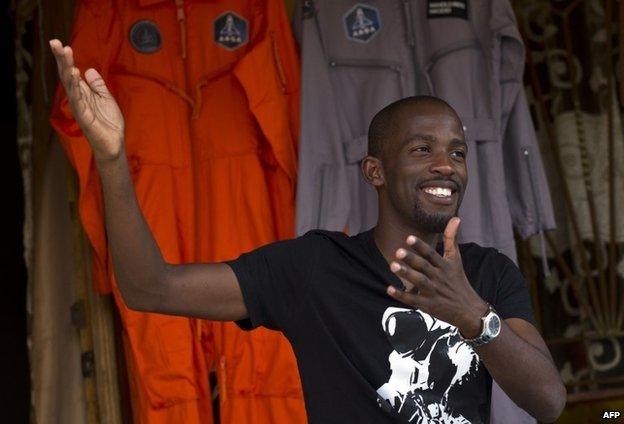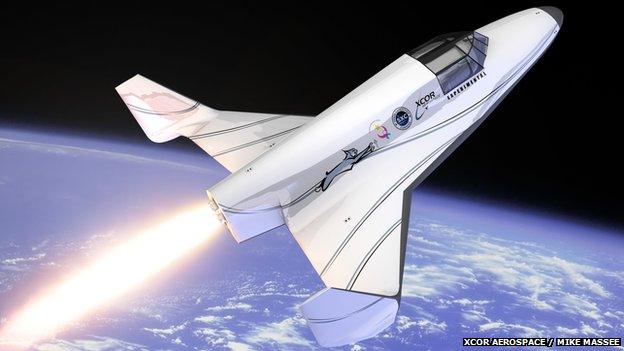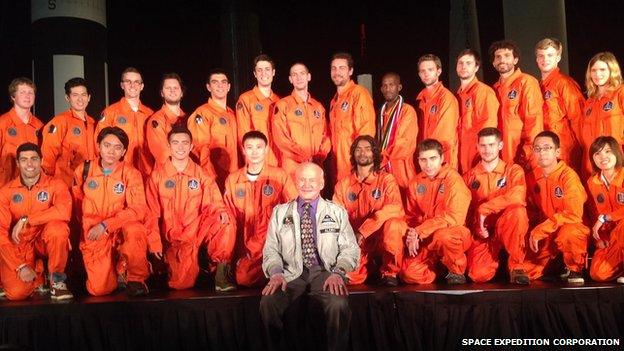Mandla Maseko: The first black African heading into space
- Published

A 25-year-old DJ from a South African township is set to become the first black African to go into space. Mandla Maseko is one of 23 people who won a seat on an hour-long sub-orbital trip in 2015. He explains how he beat one million other people to the prize.
I first saw an advert for the competition on television and then heard another ad on the radio. I had to send a photo of myself jumping from anywhere, so I chose to jump off a wall and my friend captured me in mid-air.
I had to answer a couple of questions and explain why I wanted to go into space. My response was: "I want to defy the laws of gravity, and go down history as the first black South African in space."
I was chosen to go to the local space camp in Parys in Free State - there were 30 of us there. I had to go through three challenges - two of them were compulsory. One was to skydive to earth from 10,000 feet, and the other was the vomit comet.
The vomit comet is a room where you stand up against the wall and it starts spinning, and at some point the floor disappears so you end up being pushed against the wall by G-Force. The challenge in there was to pick up five flags from beneath your feet and put them above your head.
I nailed that one, and the group was narrowed down to six people and we had to do what we called the plane stunt.
We were taken up to about 3,000 or 4,000 feet in a plane and the pilot did all sorts of acrobatic manoeuvres like loops, turns and the Cuban 8.
When we got off the plane with all that adrenalin rushing around, we had to calm ourselves down very quickly, and do a written test answering questions about the flight.

The Lynx Suborbital Vehicle will take Maseko and the other winners into space
I made it to the top three, and we flew to Orlando in Florida on 1 December where there were 109 competitors from around the globe.
We did more challenges which were very, very, very tough, but I'm a typical township boy and I was taught to face all the challenges thrown at me head on, and I did. We had to do air flight simulation, air combat, the zero gravity flight, the assault courses - you name them. I completed them all successfully.
When they announced the winners and called out my name I wasn't prepared, so the minute I realised that it was my name that got called out, my body ignited - it was an out of body experience. It still hasn't really sunk in yet. I think it'll sink in the minute I launch into space.
I will take my South African flag that has a map of Africa on it. I also want to take a song by PJ Powers and Ladysmith Black Mambazo called World in Union. "If I win, lose or draw, it's a victory for all. It's a world in union, the world as one. As we climb to reach our destiny a new age has begun" - those are the words that really speak to me in the song.
I will also play my national anthem as I go into the space craft - that goes without saying, I have to play my national anthem.
My family and friends are all excited and happy for me. I was born and raised in Mabopane and Soshanguve townships, so I'm a Pretorian to the core. Thanks to my Dad, I've never gone to bed without having eaten or without having a roof over my head.
And my Mum - I would go for an interview and then come back and not get the job and she would be like: "Ah don't worry, something bigger is coming for you - this one was not for you."
I would be like, "Ah you're my Mum - you're supposed to say such things." But then when something happens, like me going to space then it's like wow, my Mum really said it: "This is big."

The winners of the competition with Buzz Aldrin, who has walked on the moon
Usually we hear about these kinds of achievements being accomplished by people who are not from our own surroundings, but then when it happens to someone that you can relate to, it becomes an overwhelming feeling, so people who live near me are happy.
I get stopped and people say: "We are proud and we are behind you all the way."
Now space is reachable - it was a far-fetched dream for us township people. Now it is achievable and I am hoping and praying that people will be interested in it more.
I wanted to do something out of the ordinary - I like to explore things and this was a great opportunity for me.
I wanted to do something that will motivate and inspire the youth of South Africa and Africa as a whole, and hopefully to some extent, the youth worldwide, and show that it doesn't matter what background you come from, you can have whatever you want as long as you put hard work and determination into it.
After I go into space I am hoping to finish my civil engineering studies. I had to put them on hold before the competition because I didn't have enough money to fund them.
I would also like to study aeronautical engineering and hopefully qualify as a mission specialist, and then next time, go to the moon to plant the South African flag there.
Mandla Maseko spoke to Newsday on the BBC World Service.
Follow @BBCNewsMagazine, external on Twitter and on Facebook, external